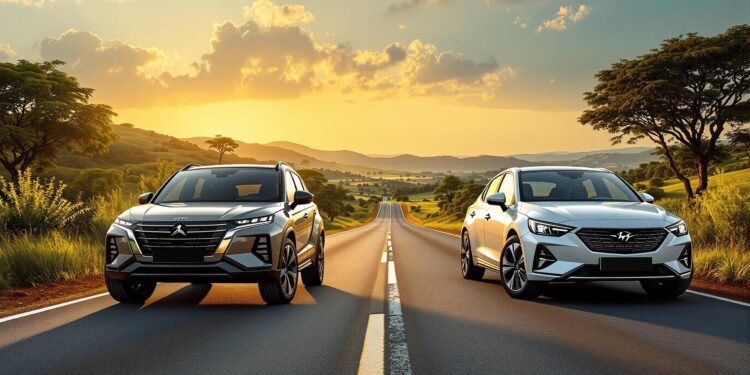Struggling to choose between diesel and petrol for your vehicle in Kenya? Here’s the quick answer:
- Diesel is ideal for long-distance driving, heavy loads, and rural roads. It’s fuel-efficient, durable, and handles tough terrain well. However, it comes with higher maintenance costs and stricter emissions regulations.
- Petrol is better for city commutes and shorter trips. It offers smoother acceleration, lower maintenance costs, and is quieter, but it’s less fuel-efficient and has a shorter engine lifespan.
Quick Comparison
| Factor | Diesel | Petrol |
|---|---|---|
| Fuel Economy | 20-30% better efficiency | Less efficient |
| Durability | Over 300,000 miles lifespan | Shorter lifespan |
| Performance | High torque for heavy loads | Faster acceleration, smoother ride |
| Maintenance | Higher costs | Lower costs |
| Fuel Cost (Apr 2025) | KES 163.95/l (USD 1.27) | KES 173.29/l (USD 1.34) |
| Emissions | Higher NOₓ and particulates | Lower emissions |
Bottom line: Diesel is better for long-term, heavy-duty use, while petrol suits short-term, city driving. Your choice depends on your driving needs, budget, and environmental concerns.
PETROL VS DIESEL || WHICH ONE SHOULD YOU BUY …
Fuel Costs and Economy
Let’s break down how diesel and petrol stack up in terms of fuel costs and mileage.
Mileage Comparison
Diesel 4WDs with engines 3.0 liters or larger offer 20–30% better fuel economy in both city and highway driving compared to petrol models. They also perform better when carrying heavy loads.
Current Fuel Costs
As of April 21, 2025, petrol is priced at KES 173.29/l (USD 1.34), which is 5.63% higher than diesel. This marks a drop from last year’s price of KES 195.55/l.
Total Cost Over Time
According to ACE Mechanics, the cost-effectiveness of diesel and petrol depends on how long you own the vehicle. Driving a diesel vehicle for more than two years results in lower overall costs, while petrol is the cheaper option for shorter ownership periods.
Here’s how it breaks down:
- Long-distance drivers: Diesel shines with better fuel economy and durability over extended trips.
- City commuters: Petrol is often preferred due to lower maintenance costs and better performance on shorter drives.
- Heavy-load users: Diesel is the go-to for those frequently carrying cargo or transporting multiple passengers, thanks to its efficiency under strain.
Next, let’s dive into upkeep and reliability.
Upkeep and Reliability
Diesel engines can last over 900,000 km before needing a major overhaul, but repairs typically cost 20–30% more than those for petrol engines. While diesel engines tend to have a longer lifespan, the overall maintenance expenses throughout the life of the vehicle are comparable to petrol engines. High-mileage drivers often prefer diesel for its durability, while short-term owners benefit from the lower repair costs of petrol engines. Up next, we’ll look at how each engine performs on Kenya’s varied roads.
sbb-itb-e5ed0ed
Road Performance in Kenya
Kenya’s roads – ranging from Nairobi’s smooth asphalt to the challenging rural gravel – highlight the strengths of diesel’s torque and petrol’s quick responsiveness. Now, let’s dive into how these engines perform on the road.
City vs. Rural Driving
In Nairobi’s busy streets, petrol engines offer smoother acceleration and quieter performance during stop-and-go traffic. On the other hand, diesel engines shine on rural gravel roads, where they handle uneven terrain and provide consistent power. The 2024 WRC Safari Rally was a prime example of Kenya’s tough gravel tracks, with participants battling punctures and mechanical breakdowns.
Handling Heavy Loads
Diesel engines stand out when it comes to heavy loads. Whether it’s commercial transport, carrying a full family, climbing steep rural roads, or towing, diesel’s higher torque makes it the go-to option. This capability is crucial for businesses and large families navigating Kenya’s varied landscapes.
Choosing the Right Engine
The choice between diesel and petrol often depends on how the vehicle will be used. Diesel is ideal for long highway trips, heavy cargo, and rural terrain. Petrol, on the other hand, is better suited for city commutes, short drives, and lighter loads. For Kenyan drivers, the decision boils down to this: diesel for long distances and rugged roads, petrol for urban driving and shorter journeys. Up next, we’ll look into emissions and regulations that could influence your decision.
Emissions and Rules
When it comes to choosing a vehicle, engine performance and running costs are often at the forefront of buyers’ minds. However, emissions and regulations can play a big role, especially in areas like Nairobi, where stricter policies are in place. These factors influence not just the cost of ownership but also whether a vehicle is allowed on certain urban roads.
Emission Outputs
Diesel engines are known for their fuel efficiency, but when it comes to emissions, the story changes. Here’s a comparison of emissions between diesel and petrol engines based on current models [9]:
| Emission Type | Diesel | Petrol |
|---|---|---|
| CO₂ | 120-140 g/km | 150-170 g/km |
| NOₓ | 0.5-0.8 g/km | 0.05-0.07 g/km |
| Particulates | 0.025 g/km | 0.001 g/km |
Some key takeaways from NTSA testing data [10]:
- Diesel engines release about 20% more NOₓ and particulates compared to petrol engines.
- Modern petrol engines generate less harmful emissions overall.
- Diesel vehicles that meet Euro 4 standards have significantly lower particulate emissions.
Current Laws
Kenya’s National Transport and Safety Authority (NTSA) has implemented several regulations aimed at controlling vehicle emissions [11]:
-
Mandatory Requirements:
- Vehicles must undergo a Performance Inspection Test (PIT) every two years.
- Diesel vehicle inspection fees are higher (KES 3,500) compared to petrol vehicles (KES 2,800).
- Diesel engines manufactured after 2015 must pass particulate filter checks.
-
Urban Restrictions:
- Driving in Nairobi’s Central Business District requires vehicles to comply with Euro 4 standards.
- Commercial diesel vehicles are subject to stricter emission limits.
- Vehicles that fail emission tests have their registration suspended until repairs are made.
-
Tax Implications:
- Euro 5-compliant vehicles benefit from lower road tax rates.
- Diesel vehicles older than seven years incur an additional annual fee.
- Diesel fuel imports are subject to an environmental levy [12].
Making Your Choice
After considering factors like cost, upkeep, performance, and emissions, here’s a quick guide to help you decide.
Buying Tips
- Long-distance driving: Diesel engines offer 20-30% better fuel efficiency, saving money over time.
- City commuting: Gasoline engines provide smoother acceleration and better responsiveness in stop-and-go traffic.
- Towing or heavy loads: Diesel’s higher torque is ideal for pulling heavy weights or driving on rural terrain.
FAQs
What are the long-term costs of owning a diesel car compared to a petrol car in Kenya?
The long-term costs of owning a diesel vehicle versus a petrol one in Kenya depend on factors like maintenance, fuel efficiency, and usage. Diesel engines are typically more fuel-efficient, making them a cost-effective choice for drivers covering long distances or transporting heavy loads. However, they often come with higher maintenance costs, especially for smaller or older models.
On the other hand, petrol engines tend to have lower upfront costs and are generally cheaper to maintain. They are a good option for drivers with lighter usage or those who prioritize smoother performance over durability. For vehicles expected to handle high mileage or rugged conditions, diesel engines may offer better value over time due to their durability and longer lifespan.
How do Kenya’s emissions regulations impact my choice between diesel and petrol vehicles?
Kenya’s emissions regulations, established under the Environmental Management and Coordination (Air Quality) Regulations of 2014, set standards for both diesel and petrol vehicles to minimize air pollution. These rules aim to ensure cleaner air by limiting harmful emissions from internal combustion engines.
When choosing between diesel and petrol vehicles, consider that diesel engines typically emit more nitrogen oxides (NOx) and particulates, which may require additional maintenance or technology to meet these standards. Petrol engines, while producing fewer particulates, may emit more carbon dioxide (CO2). Your choice should balance compliance with these regulations, fuel type, and your overall driving needs in Kenya.
What should I consider when choosing a vehicle for both city driving and long-distance travel in Kenya?
When selecting a vehicle for both city driving and long-distance travel in Kenya, it’s important to weigh key factors:
- Fuel Efficiency: Diesel engines typically offer better fuel economy, especially for long highway trips, while petrol engines are more efficient for shorter city commutes.
- Performance: Diesel engines provide higher torque, making them great for highway cruising and carrying heavy loads. On the other hand, petrol engines deliver quicker acceleration and a smoother ride, ideal for stop-and-go city traffic.
By considering your driving habits, budget, and the type of terrain you’ll encounter, you can make a choice that suits your needs and ensures a comfortable driving experience.
Related posts
- Best Fuel-Saving Vehicles for Everyday Driving Across Kenya
- Land Cruiser vs. Prado: Best for Kenyan Off-Roading
- Best used cars to buy in Kenya
- Most sold cars in Kenya this year




